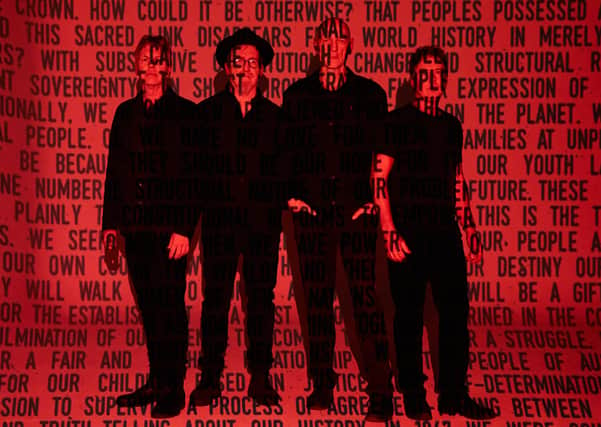Midnight Oil: ‘The songs had this strong theme around relations between black and white in this country’


Yet even the Wahroonga-born frontman and ex-Labor MP found himself taken aback when the band returned in 2017 for a run of shows to find that the studiously political five-piece’s absence had only made hearts grow fonder.
“It was a big surprise to find ourselves, including in the UK, with a bunch of people that came out to see us,” he reflects. “I never expected, after such a break, that we would all be spending so much more time working together. It’s ended up in a sort of surreal, move-like frame for us, far more so than we could have hoped for.”
Advertisement
Hide AdAdvertisement
Hide AdGarrett would likely balk at the suggestion of the group’s re-emergence as that of an old-fashioned Hollywood ending, mostly because it is far from the final curtain for the Australian rockers. Last week, the band’s twelfth album The Makarrata Project landed on shelves, turning the page for a new chapter in the Oils’ ever-growing history.
At sixty-seven, Garrett remains a lithe, energetically eloquent figure with the air of an individual with a decade less on his shoulders; the record, matched with the band’s globetrotting performances, shows that he and his bandmates – guitarists Jim Moginie and Martin Rotsey, drummer Rob Hirst and bass player Bones Hillman – have lost none of their edge in their absence. But the vocalist notes that the band only decided to return to the studio once they had assuaged their fears that they would otherwise be trading on former glories.
“I think one of the great horrors we had was this idea that we wouldn’t be able to equal what we’d done previously, or that we were simply taking the easy options in terms of making music,” he reflects. “We were determined to not do anything in a nostalgic sense. We thought that if we’ve got the songs, we should pull them out and see what we could do with them, if we had anything worth sharing.”
They certainly did. The Makarrata Project is unlike any other album the band have released. Though brief, at only seven tracks, it arguably boasts a thematic consensus unlike any other album in their frequently topical catalogue; an alternatively rousing, wounded collection of songs united by a passionate shared call for reconciliation with Indigenous Australians.
Advertisement
Hide AdAdvertisement
Hide Ad“Of the songs that we had, about eight or nine had this strong theme around relations between black and white in this country,” Garrett notes. “It is still a source of controversy and concern for many, including ourselves.” In the current climate, he adds that the music felt like it was “calling out” to be recorded, but that the band – who, for all their campaign work with the Aboriginal community in their homeland, are still five white men – felt that they could not be the only arbiters of such material.
The Makarrata Project then is a more of a collaborative effort. The band’s presence runs through its DNA, but they are not the only ones making their plea for a greater Aboriginal voice in modern Australia. A host of Indigenous artists take centre stage instead, ranging from veterans like the late Gurrumul Yunupingu through chart stars such as Jessica Mauboy and rising talent in the shape of Tasman Keith and Alice Skye. It is arguably a more avuncular role for the group, almost as elder statesment – though the eloquent Garrett would likely refute that notion too.
“The only way we could do this album, the only way we could honour this country, was to share the songs with First Nations Australians,” Garrett expounds. “I mean, they’re hardly recognised in our constitution, for heaven’s sake. Their issues are weighty and they’ve very important to us. Sharing these songs with old friends and new ones, turning it into this album, has been quite incredible for us.”
Plans to return to the stage with the new record in tow have been scuppered by the coronavirus crisis, including fresh dates in Europe and a show on the National Mall in Washington DC for the anniversary of Earth Day (“We’re particularly animated about the climate crisis,” Garrett reaffirms) but the group remain hopeful that The Makarrata Project will see live audiences in Australia with a run of as-yet unannounced, scaled-back shows next March and April.
Advertisement
Hide AdAdvertisement
Hide Ad“Midnight Oil will really be the last train to leave the station when it comes to playing,” the singer admits. “There’s never been a stage that we weren’t anything other than primal beings on, trying to smash it out and spill blood. People aren’t going to stand one-and-a-half metres apart, sipping their sherry. When we get on stage, we want to tear strips off everything we can find. We wouldn’t be us if we weren’t.” After several decades staying true to themselves, the band won’t be short-changing that anytime soon.
Midnight Oil’s album The Makarrata Project is out now. www.midnightoil.co
Comment Guidelines
National World encourages reader discussion on our stories. User feedback, insights and back-and-forth exchanges add a rich layer of context to reporting. Please review our Community Guidelines before commenting.